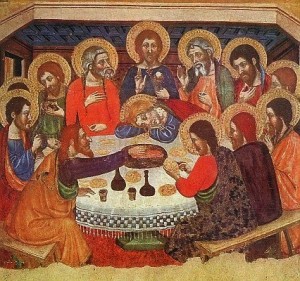Jesus said:
Those who eat my flesh and drink my blood have eternal life, and I will raise them up on the last day; for my flesh is true food and my blood is true drink. Those who eat my flesh and drink my blood abide in me, and I in them.
(From the Daily Office Lectionary – John 6:54-56 – August 27, 2012)
 The Jews, John tells us, disputed among themselves as Jesus was delivering the lengthy dissertation on bread from which these statements come. Earlier he had introduced this idea that his flesh was bread to be eaten by his followers: “I am the living bread that came down from heaven. Whoever eats of this bread will live for ever; and the bread that I will give for the life of the world is my flesh.” (v. 51) The very idea of consuming human flesh is off-putting, even disgusting, and would have been extremely objectionable to the Jews; no wonder they grumbled and mumbled, complained and disputed. Even as a metaphor, the statement demands a lot from Jesus’ followers!
The Jews, John tells us, disputed among themselves as Jesus was delivering the lengthy dissertation on bread from which these statements come. Earlier he had introduced this idea that his flesh was bread to be eaten by his followers: “I am the living bread that came down from heaven. Whoever eats of this bread will live for ever; and the bread that I will give for the life of the world is my flesh.” (v. 51) The very idea of consuming human flesh is off-putting, even disgusting, and would have been extremely objectionable to the Jews; no wonder they grumbled and mumbled, complained and disputed. Even as a metaphor, the statement demands a lot from Jesus’ followers!
Church-going Episcopalians (and others who participate weekly in Holy Communion) are perhaps overly familiar with the metaphor. It’s not that we have somehow explained it away, I don’t think we have. Rather we have made it routine. Weekly (or more frequent) communion, with sweet wine and tasteless little cracker we laughingly call “bread” seems to have weakened the impact of this shocking metaphor. I mean, really, to someone who does not hear these words through 2,000 years of eucharistic practice, eating flesh and drinking blood sound a whole lot like cannibalism and vampirism.
How can we recapture the power of this metaphor? How can we make it make sense both to ourselves and to the non-church world in the 21st Century? As a ministry colleague has put it, “How would we explain this to a person who has watched Buffy the Vampire Slayer and read every word of the Twilight Series, but never stepped foot in a church or even know what the Bible is?”
I wish I had the answer to these questions, but the answers are less important than the questions themselves. Simply knowing that there are questions, acknowledging that they are real, that they are troubling, that they are important, and that there are no easy answers is the first step in our calling to show that Christ is real, and troubling, and important to the world, that Christ is relevant in the 21st Century.
Questions are much more important than answers, especially the hard ones.
====================
Father Funston is the rector of St. Paul’s Episcopal Church, Medina, Ohio.



Leave a Reply